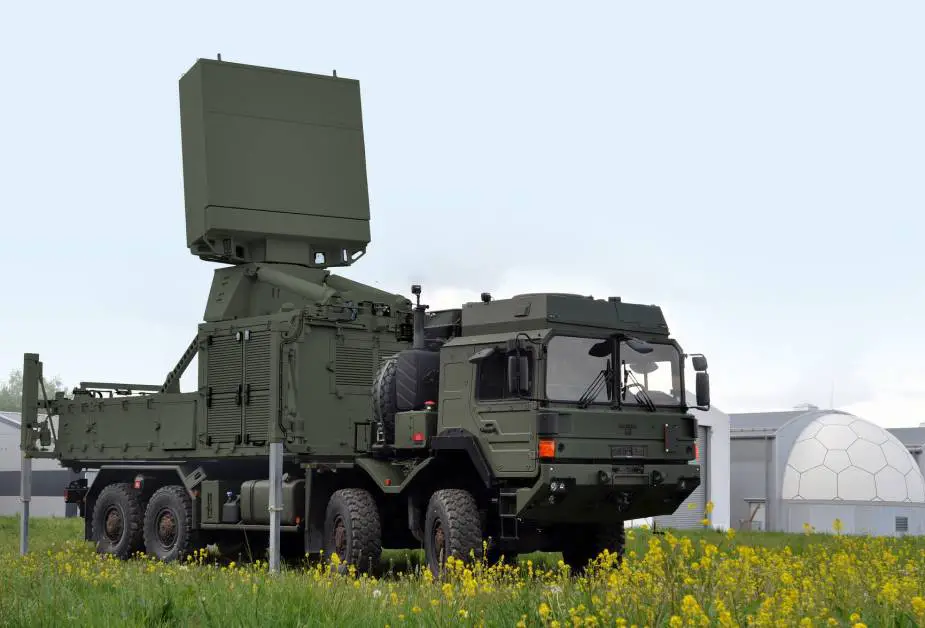Breaking news
Hensoldt presenting TRML- 4D multi-function air surveillance and target acquisition radar.
Hensoldt is presenting its new TRML-4D multi-function air surveillance and target acquisition radar. It is Hensoldt’s latest member of the C-Band (NATO G-Band) ground-based air defense radar family.
Follow Army Recognition on Google News at this link

TRML- 4D multi-function air surveillance and target acquisition radar (Picture source: Hensoldt)
Based on the most advanced Gallium Nitride Active Electronically Scanned Array (AESA) sensor technology with multiple digitally formed beams, TRML-4D is designed for near- to long-range ground-to-air detection and for weapon assignment. It is capable of detecting, tracking, and classifying various types of air targets. The focus is on small, fast and low-flying and/or maneuvering cruise missiles, aircraft and hovering helicopters as well as UAVs.
Its secondary radar is capable to deal with the interrogation modes up to Mk XIIA/S. TRML-4D's unique concept of simultaneous multi-beam and Doppler processing ensures reliable performance of all operational tasks at a high update rate.
TRML-4D is excellent in complex environments with mixed clutter and high target densities. Due to its outstanding radar performance, it supports short-range and medium-range surface-to-air missile systems. TRML-4D is designed for continuous operation and high operational availability.
The probability for zero critical failures during a 24/7 mission is more than 90%, this results in very significant advantages on the logistic support.
Maintenance-free missions are enabled by graceful degradation using multiple solid-state transmit and receive modules. The low MTTR, high reliability per component and the advanced built-in test equipment (BITE) together with ease maintenance and facilitate the low life cycle costs of TRML-4D.
Thanks to its electronic look forward / back scanning capability, the TRML-4D provides weapon systems with more time for a reaction:
• Scanning a dedicated sector twice per mechanical rotation (“cued search” function) depending on recon information
• Initiating a track within a single scan (look back functionality) for threatening targets
• Automatically classifying specific targets as high priority threats and allocating additional radar illumination (“cued track” functionality)
Due to the higher track update rate resulting from this, the TRML-4D creates reliable tracks more quickly and with a minimum number of scans and, in this way, increases the time available to weapon systems for reaction, also in the case of maneuvering and pop-up targets.
The precise calibration of all antenna parts in combination with the given antenna aperture in the C band yields highly accurate tracks, even for the smallest of flying threats, in both symmetric and asymmetric conditions, to ensure exact and fast weapon assignment and increased hit probability.
Allocating radar resources to different scan types allows high-volume search and high-priority tracking to be combined in a sophisticated way. This combination of measurements ensures reliable tracking performance and target classification, especially for maneuvering threats. Advanced, automatically triggered ECCM (Electronic Counter-Counter-Measures) and the tracker’s high saturation level guarantee the system’s performance even when jamming or interfering signals are present. The radar has sufficient capacity to uphold all functions simultaneously so as to ensure mission success even in stressful situations involving a high density of targets. TRML-4D'sexcellent survivability in highly congested combat environments can even be increased by the combination with Hensoldt'sTwinVis passive radar.
Its modular architecture and its ability to be defined by software allow the radar system to be customized and its capability to be enhanced incrementally so that it is up to date throughout its life and fit for future challenges at any time.For example, the implementation of dedicated CRAM capability is currently being developed by SW adaption.
Completed with Hensoldt Sensors’ well-established SSR (Secondary Surveillance Radar) interrogator MSSR 2000 I, TRML-4D provides the inevitable and reliable track identification to avoid friendly fire. The MSSR 2000 I is capable to deal with interrogation modes up to Mk XIIA/S, including Mode S and Mode 5.


























